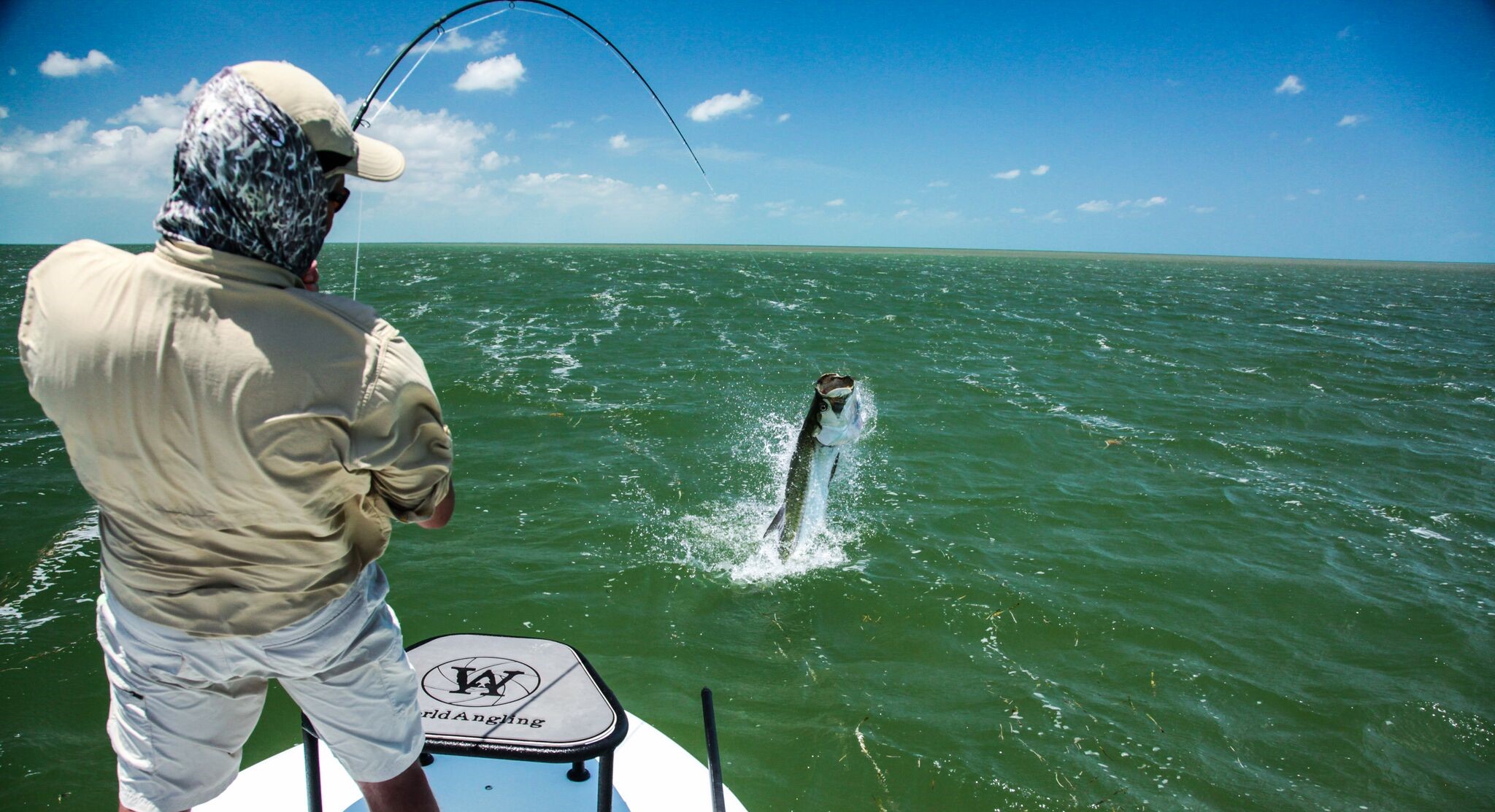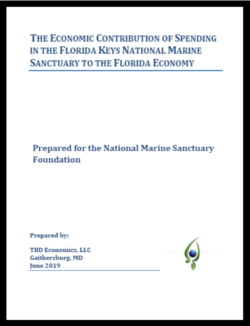
The 43,000 jobs supported by the sanctuary span the state
Healthy sanctuary ecosystems are the key to its economic benefits
Silver Spring, Md. – July 30, 2019 – The National Marine Sanctuary Foundation released a study showing that economic activity generated in Florida Keys National Marine Sanctuary is responsible for contributing $4.4 billion and 43,000 jobs across the state of Florida.
Florida Keys National Marine Sanctuary is a major driver of tourism and recreation dollars, offering opportunities for world-class diving and fishing alongside abundant and varied wildlife. Increased use, boat groundings, marine debris, pollution, intensifying storms, disease outbreaks, rising ocean temperatures and acidification are among the threats to the environment and the economy that the sanctuary supports. The report demonstrates the need to protect and restore the fragile habitats of the Florida Keys for the economic well-being of the entire state.
Kris Sarri, president and CEO of the National Marine Sanctuary Foundation, said, “The sanctuary and its underwater wonders are what set the Keys apart and make them such a tremendous tourism destination. In light of the sanctuary’s impact on the whole state of Florida, the protection and restoration of its valuable resources is a major priority.”
Understanding the economic impact of Florida Keys National Marine Sanctuary is critical as future decisions are made about its management at the federal, state and local levels. The sanctuary is an irreplaceable treasure that will require careful management and community support to maintain and enhance its splendor.
“There is no doubt that sanctuary resources are among the top incentives attracting vacationers to the Florida Keys,” said Stacey Mitchell, director of the Monroe County Tourist Development Council, the Keys’ destination marketing office. “The TDC not only understands and appreciates the sanctuary’s value, but actively promotes its protection. We want Keys visitors to connect with the sanctuary and also engage to protect it.”
The study, conducted by TBD Economics, LLC, describes how spending on tourism and recreation is driven by resources within and around the sanctuary and provides jobs, wages, and contributions to the gross domestic product (GDP) across the state of Florida. Contributions to the Florida economy increased each year of the study, from $4.2 billion in 2015 to $4.4 billion in 2017. Expenditures on tourism and recreation in Florida Keys National Marine Sanctuary also led to $1.46 billion in labor income statewide in 2015, and $2.57 billion in value added to the state economy over the cost of business inputs. Employment supported by sanctuary use rose for every region of the state, and statewide from 38,000 jobs in 2015, to 41,000 in 2016, and 42,900 jobs in 2017.
While the majority of the sanctuary’s economic impact is felt in Monroe County, the nearby high-population urban areas, including Miami-Dade, Broward, and Palm Beach counties, benefited greatly as Monroe County relies on goods and services to support tourism in the sanctuary. Sanctuary-related spending resulted in more than 1,300 full-time jobs and $214 million in economic output in those nearby counties. Sanctuary-related spending also supported 161 jobs and $42 million in economic output in southwest Florida, from Charlotte County up to Pasco County north of Tampa Bay. Other regions farther from the Florida Keys experienced smaller numbers, yet still benefited.
With a population of approximately 75,000 residents, the Florida Keys annually receive about three million overnight vacationers and more than 400,000 day visitors. Key West hosts about 750,000 cruise ship visitors each year. About one-third of visitors to the Keys are Floridians, meaning natural and cultural resources in the island chain offer beneficial opportunities for state residents beyond economic impact.
The report also showed that ocean-related tourism is generally resilient to economic downturns. However, that economic strength is reliant on a healthy, clean and safe natural environment. In the Florida Keys, 54 percent of jobs and 60 percent of all spending are related to tourism.
The report included an analysis of the potential effects of harmful algal blooms (HABs) in the Florida Keys. The analysis shows that in a normal year, the impacts to the state of Florida from HAB events impacting the Florida Keys NMS could result in approximately $389 million lost from the economy, while an extreme HAB event in the Florida Keys NMS could cause up to $1.5 billion in damages.
National marine sanctuaries are America’s network of underwater parks encompassing more than 600,000 square miles of marine and Great Lakes waters, administered by the National Oceanic and Atmospheric Administration’s (NOAA) Office of National Marine Sanctuaries. Sanctuaries support an environment, rich in biodiversity, that, in turn, supports local coastal and ocean economies. Visitors spend money on sanctuary-supported activities such as fishing, beach visits, boating, snorkeling, diving, research, and education activities, and other tourism-related expenditures such as travel, food, and lodging.
Florida Keys National Marine Sanctuary protects spectacular, unique, and nationally significant marine resources stretching from Miami to the Tortugas, including North America’s only coral barrier reef, extensive seagrass beds, mangrove-fringed islands, and more than 6,000 species of marine life. The sanctuary also protects an estimated 800 underwater historic sites. As one of North America’s most popular diving and fishing destinations, Florida Keys National Marine Sanctuary supports the region’s success in global tourism, with more than half the jobs in Monroe County tied to ocean activities. Beyond its recreation riches, Florida Keys National Marine Sanctuary provides innovative educational programs, citizen science, volunteer opportunities, and high-tech research and conservation work.
On August 2–4, 2019, NOAA’s Office of National Marine Sanctuaries is hosting its fifth national Get into Your Sanctuary celebration to raise awareness about the value of our national marine sanctuaries as iconic destinations for responsible recreation.
Contact: Chip Weiskotten, Director of Strategic Communications
301.608.3040 x 305, chip@marinesanctuary.org
###
The National Marine Sanctuary Foundation, established in 2000, is the official non-profit partner of the National Marine Sanctuary System. The Foundation directly supports America’s national marine sanctuaries through our mission to protect species, conserve ecosystems and preserve America’s maritime heritage. We accomplish our mission through community stewardship and engagement programs, on-the-water conservation projects, public education and outreach programs, and scientific research and exploration. The Foundation fosters innovative projects that are solution-oriented, scalable and transferable, and develop strategic partnerships that promote the conservation and recovery of species and their habitats. Learn more at marinesanctuary.org.
The Florida Keys National Marine Sanctuary Foundation is a local chapter of the National Marine Sanctuary Foundation to inspire the public to protect Florida Keys National Marine Sanctuary. The chapter’s priorities include establishing partnerships with local businesses and organizations to invest in on-the-water conservation projects. The chapter’s programs include supporting marine debris removal, improving buoy and marker infrastructure to support sustainable recreational use, and supporting efforts to combat coral disease and restore the reef ecosystem.

